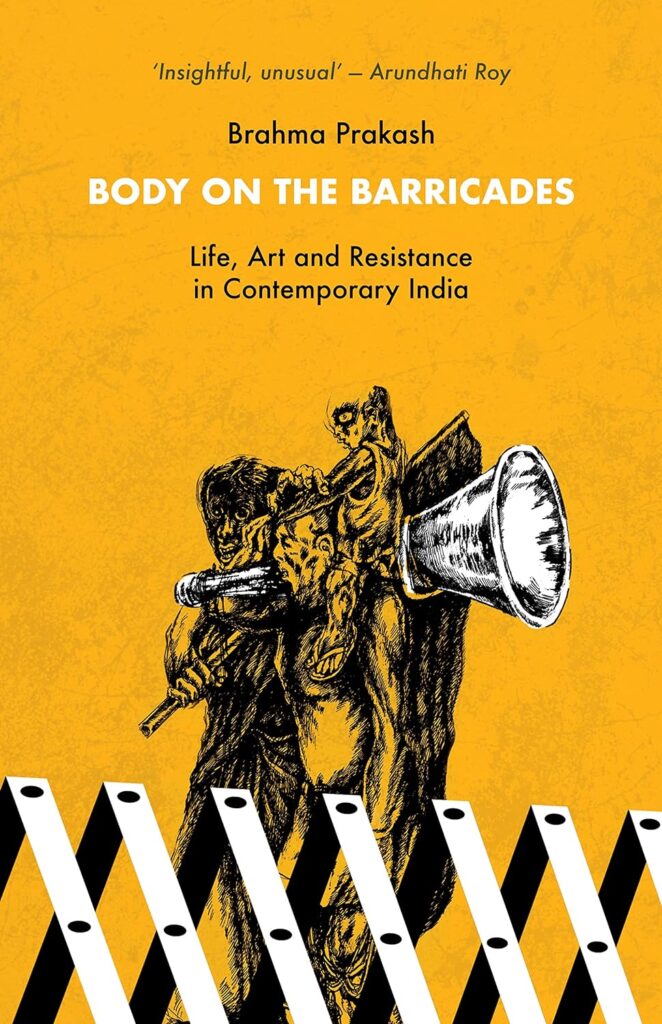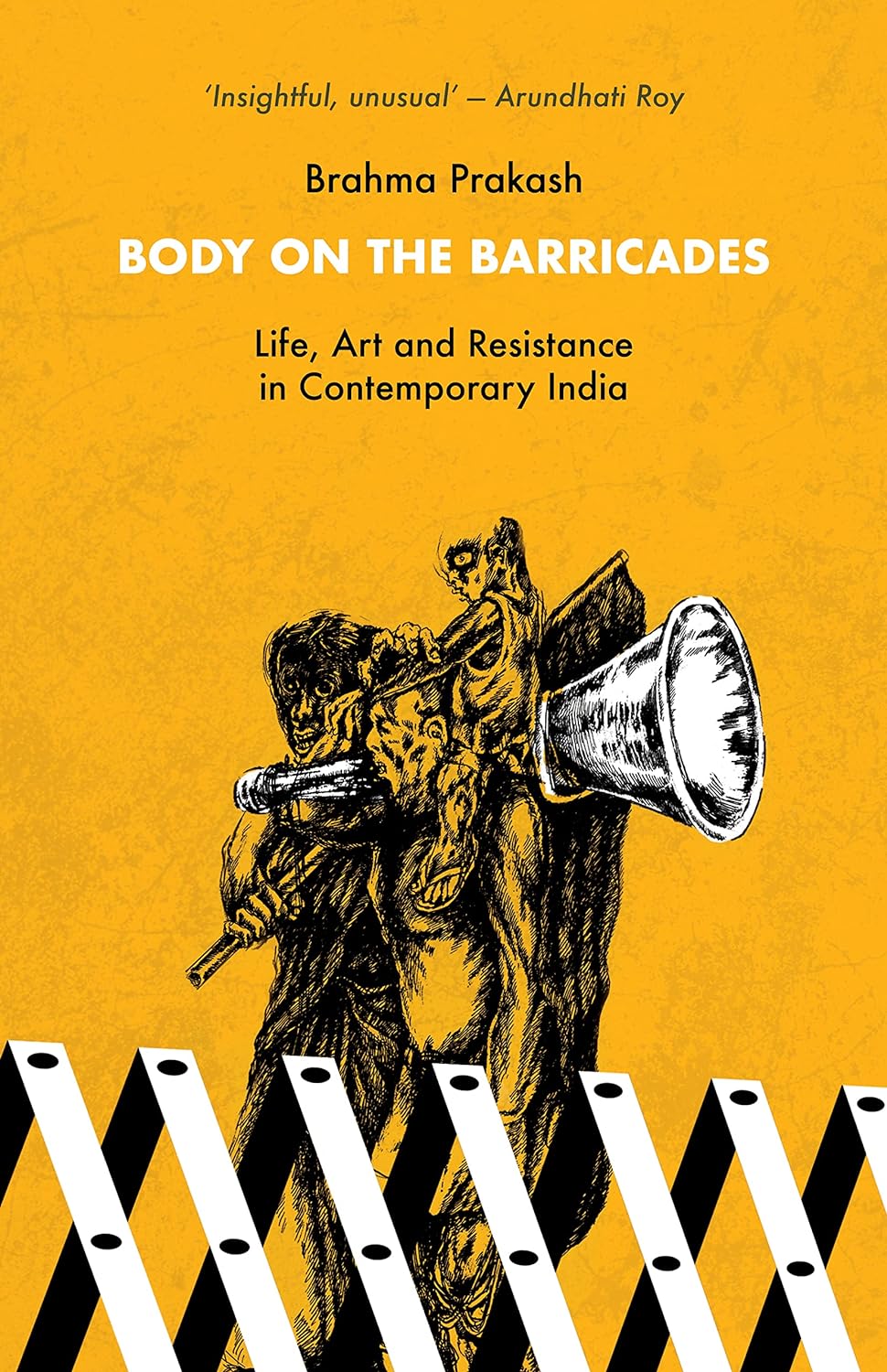
‘I can’t breathe’ said George Floyd when he was brutally murdered. Remember that – Floyd did not die of COVID-19, the disease which took away the breath of many from the world! Do not forget that the second largest migration because of the ruthless lockdown imposed on Indians due to COVID-19 was because of COVID-19 alone! Many bodies were cremated, but not all had COVID-19! Many did not have food to eat or, the strength to walk further to their source area! Not all had balconies for clapping and smashing plates to further utter the mantra of ‘go corona’! Breathing in a breathtaking world, living in a lifeless polity, eating in a world of restrictions, etc. leads us to the foremost question of whether we are living in a world where breathing is a privilege. The post-covid world struggles to breathe. Breathing is no longer just breathing through the nose, it is more of an exercise of existing through being and breathing for the ‘other’.
Body on the Barricades: Life, Art and Resistance in Contemporary India by Brahma Prakash (published by LeftWord in 2023) throws light on how the world is being ‘perfectly’ created in a ‘fake’ manner. Words carry meaning and since they carry meaning they become nothing but performances. But when these performances had a mix of rhetorics, it becomes meaningless. A sense of being excluded through creating a formidable ‘other’ as a tool grips the larger imagination of today. Being a ‘non-other’ through creating the ‘other’ is what Prakash exposes through his mastered strokes of storytelling in this book.
The constant hate that is meted out to Muslims is brought out in the chapter ‘Will You Hate Him, as You Hate Me’. He raises a question – when a bone is fractured we all cry in pain but when a bone of the nation is fractured why don’t all of us do the same? Perhaps this is where the question of ‘we’ emerges. When Ambedkar was asked what is fraternity? He replied it is the ‘we feeling’. Today how many of us have this feeling despite the same being clearly stated in the preamble of our constitution?
Prakash writes that ‘We’ is not based on a sense of privileges and valourization but a sense of vulnerability and longing. It carries the indefinability of plurality that cannot be named (p. 29). Using words at the cost of losing words is the time we live in, cautions the author. Of course, it is not to do with the words but it is to do with the people who use these words.
It is precisely for this matter I have decided to call this work a seminal text that excavates the ‘perfective fakeness’ immanent across time and space. This text employs a very willful strategy of what I would call ‘telling without telling’ which is why the excavation of ‘perfective fakeness’ also becomes all the more telling. A simple example to substantiate the telling would be – In a hierarchical society pushed into monologues where the husband speaks, and the wife listens; The priests speak, and the devotees listen; The guru speaks, and the pupils listen; The leaders speak, and the followers listen; where is the value for the one getting othered? Prakash is right with his findings of words having become the real captives under neo-conservative and neoliberal regimes.
To further drive home the Perfective Fakeness as a norm that grips the present Prakash writes succinctly – ‘The leaders who practice monologues clearly know that dialogue would lead to their defeat. Therefore, they set up the radio. They design the studio. They plant their spineless anchors in the television rooms. They provide words into their mouths. Like an old poet of feudalism, the anchors sing praises. Criticality loses its way, and uncritical celebrations of culture, society and traditions become the norm’.
Like the way Gaddar taught us the voice of resistance, Prakash with this book gives life to words in a ‘perfective fake’ post-Covid World. Many a time I have felt a very close resemblance of Prakash’s storytelling to that of Walter Benjamin’s. It is not big dialogues or intellectual exhibitionism (which is on the rise) rather it is simple small sentences where one realises that no small is small. In other words, Prakash’s storytelling like that of Benjamin is a situational analysis that employs as I earlier mentioned ‘telling without telling’. A simple example in this regard would be Benjamin who writes in his Theses on the Philosophy of History that not even the dead will be safe from the enemy if he is victorious. And this enemy has not ceased to be victorious.
I urge everybody to read Body on the Barricades and not stop just reading this book review because like Benjamin or Marx who cannot be explained without quoting them, this book and Praksh also contest at such similar strange levels. I am forced to mention this in particular because many a time during the review of this book I was pushed to a state of emergency not just because we live in a state of emergency as told through this book, but also because of an inability to find alternatives to a reality that the author finds.
***
Sankar Varma is a research scholar in the Department of Economics, Christ (Deemed to be University).

[…] post Body on the Barricades: Life, Art and Resistance in Contemporary India by Brahma Prakash (2023): A R… appeared first on Doing […]